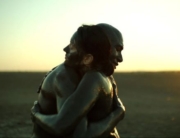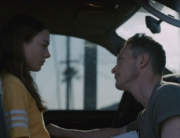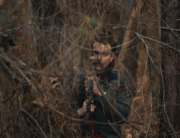The Tribeca Film Festival is back, offering an absurd amount of options for moviegoers to choose from. There’s a documentary about the fastball; a drama with Richard Gere as a creepy, rich older man worming his way into the lives of a young couple (Franny); and a Danish mood piece about teen suicide (Bridgend). This is a virtual playground for the cineaste. Here are a few reviews that may help you decide what to see.
King Jack
With the arrival of the Internet, and the preponderance of cell phone video recordings, bullying has been under the microscope as of late. King Jack uses the device of the bully to delve into the psyche of Jack (Charlie Plummer), your typical 13-year-old who does typically dumb teenage things: tagging a neighbor’s garage, sending pictures of his nether regions to a girl he likes upon her request, etc. He lives with his single-parent mom and older brother in a small rust belt town, and he’s getting by but for a particularly vicious bully, Shane (Danny Flaherty), who is older, stronger, and sadistic. As a result, Jack spends most of his time avoiding him, and generally failing.
This may sound like typical coming-of-age fodder, but director/screenwriter Felix Thompson infuses his first feature with such detail and is so good at capturing the language and behavior of his just-barely adolescent subject that it transcends and becomes simultaneously universal and pinpoint specific. This is one average, yet exceptional boy’s life told with precision and care. It is rare to find a debut that immerses you in the world the film creates so completely, but that’s what King Jack achieves. A very impressive film.
Come Down Molly
The problem with watching people on drugs is that what they are feeling is invariably more interesting than what they are actually doing. This is a lesson one wished the makers of Come Down Molly had taken to heart. A young mother, who feels overwhelmed and underappreciated, heads out to the mountains to spend the weekend with some old high school friends, all of them men. She was the tomboy, and now she is the only one with a family. They end up taking mushrooms (not the gourmet kind) and spend the rest of the movie wandering the gorgeous Colorado landscape inevitably stoned out of their gourds. Eventually Molly comes to a revelation in the poignant last minutes of the film, but it is miles to go to get there with not much going on. The cast cannot be blamed. They are all excellent, but the dialogue is dull and repetitive, and every character, aside from the lead, is sorely underdeveloped. There is a good idea here, but some judicious trimming and a tighter script would have done wonders.
Jackrabbit
Jackrabbit tells the tale of a city in a future dystopia. Sometime in the fairly recent past, all electronic systems failed, causing total infrastructure collapse. During what the period called the Reset, one city got itself back online and on point and thrived. What is beyond the city is radiation, chaos, and Lord knows what else.
The film focuses on two hackers, Simon (Josh Caras), who gains a job with the only corporation in town, and renegade loner Max (Ian Christopher Noel). Max begins receiving strange messages through his computer regarding Eric, a hacker who committed suicide. It seems something is not right in Sector 6 (the catchy name of the city). Simon and Eric team up to unravel the mystery of Eric’s suicide.
The movie has a lot going for it. It successfully creates a realistic dystopian vision on a miniscule budget. It feels like another, less comforting version of our world. The production design is just fantastic, and the acting is first-rate across the board, particularly Noel, who nails a particular form of principled, lonely, frustrated rebellion. Unfortunately, the movie is missing a very important factor in a sci-fi mystery: forward momentum. It moves like a self-involved indie drama with a couple of futuristic bells and whistles attached, instead of using the plot and the search for clues to illuminate character. However, the performers are engaging and, again, the world created feels real, but the pace hobbles an otherwise worthwhile film.
Necktie Youth
Finally, from South Africa, Necktie Youth is a dystopian read of modern, disaffected Johannesburg youth. It’s a breathless, sometimes hysterical, mostly sad luge ride toward an inevitable conclusion. Apparently, disaffected suburban youth syndrome can strike anywhere, such as in this post-apartheid, racially mixed social set. Everyone is friendly, and any tension can usually be dissipated with drugs, sex, and a call to party, but something simmers underneath. The film opens with a young girl casually committing suicide, and her death is streamed live worldwide.
The dead girl’s friends, a disparate mix of privileged young things, ruminate, dismiss, or attempt to forget their lost compadre. The focus is on two upper-class black kids, Jabz (Bonko Cosmo Khoza) and September (writer-director Sibs Shongwe-La Mer), as they spend the day drinking, driving, drugging, and philosophizing. This is interspersed with glimpses of other young adults in their orbit and interviews for a TV show where the friends are asked about the suicide.
Necktie Youth is directed with a kinetic, devil-may-care energy, which occasionally slows down to accommodate the character’s ruminations or just plain boredom. It’s shot beautifully in black-and-white with a cast of charismatic newcomers. It’s as if a young Spike Lee OD’d on Godard and just went to town. I found it fascinating. (Posted on April 24, 2015)

















Leave A Comment